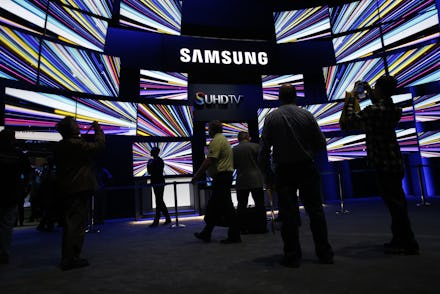Your TV Is Listening to Your Conversations — and It's Not the Only Gadget

Smart TVs offer a next-generation experience for users, allowing them to connect to the Internet, surf popular TV-watching apps and use apps like Skype and Facebook without the need for an expensive external media center. But does all this technology come as the price of our privacy?
In a warning hidden in Samsung's privacy policy for net-connected smart TVs, the manufacturer appears to caution users that everything said in front of the television could be heard, transcribed and stored by an unidentified "third party:"
If you enable Voice Recognition, you can interact with your Smart TV using your voice. To provide you the Voice Recognition feature, some voice commands may be transmitted (along with information about your device, including device identifiers) to a third-party service that converts speech to text or to the extent necessary to provide the Voice Recognition features to you. In addition, Samsung may collect and your device may capture voice commands and associated texts so that we can provide you with Voice Recognition features and evaluate and improve the features. Please be aware that if your spoken words include personal or other sensitive information, that information will be among the data captured and transmitted to a third party through your use of Voice Recognition.
As Electronic Frontier Foundation activist Parker Higgins posted on Twitter, at first glance the documentation seems eerily reminiscent of the telescreens from 1984:
The Daily Beast's Shane Harris first spotted the clause and asked Electronic Frontier Foundation intellectual property director Corynne McSherry how troublesome this language was. She said that while most of the disclaimer appeared to be necessary to authorize third-party voice to text services, "If I were the customer, I might like to know who that third party was, and I'd definitely like to know whether my words were being transmitted in a secure form."
McSherry added that the phrase "to the extent necessary to provide the Voice Recognition features to you" could be "interpreted pretty broadly."
Samsung insists everything's on the level: In a response, Samsung told the BBC that the third party identified in the privacy policy was Nuance, a firm specializing in voice recognition. The company added that it neither kept voice data indefinitely nor sold any information captured to a third party. Without the ability to transfer audio recordings of users' voices to a third-party service, Samsung insists the voice recognition software could never work.
But Samsung isn't the first manufacturer to create concerns over televisions that spy on their users. In 2013, IT consultant Jason Huntley found that his LG television appeared to be collecting information on his viewing habits regardless of whether he set "collection of watching info" to on or off. LG was forced to allow users to set their own preferences in a later update.
Then there's the issue of security. In 2012, hackers demonstrated they could easily break into Samsung's smart TV software. According to Mashable, Black Hat security conference researchers Aaron Grattafiori and Josh Yavor were able to "turn on the camera, take control of social media apps like Facebook and Skype and access files and basically any app on the set." Whoops.
The more advanced consumer devices become, the more private info they share. As voice-to-text technology becomes more ubiquitous, more electronics than ever will tune into their owners' conversations. PC Mag points out that devices such as the Amazon Echo, Microsoft Xbox One and Motorola Moto X include an "always on" listening mode. With limitless ways to cash in on what you're talking about, a Facebook-style march to capitalize on users' personal information could be just a few lines of small print away.
There's no need for imminent alarm. Unfortunately, though, the price consumers pay for smart devices seems to be a little less privacy with each iteration. So you could probably afford to be a little cautious when dealing with that cool new gadget, especially if it has a camera, microphones and access to all of your personal information.